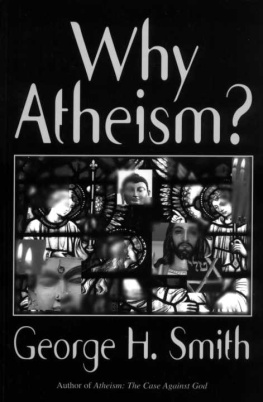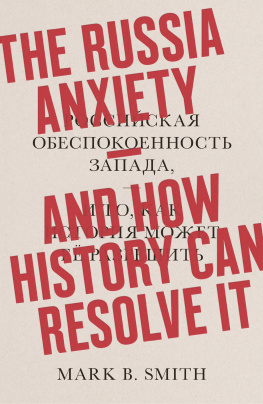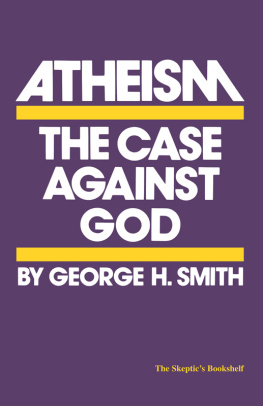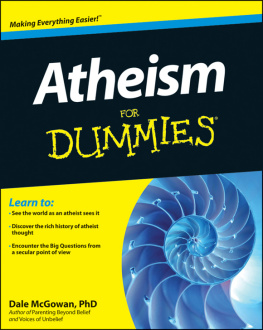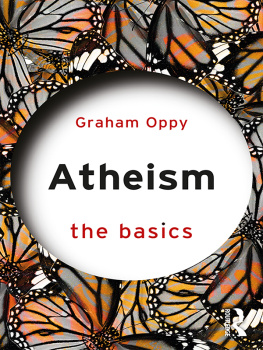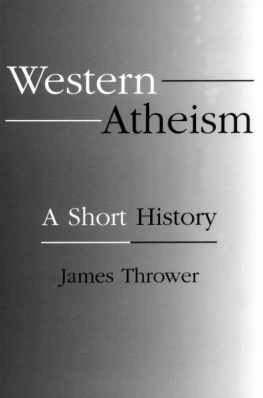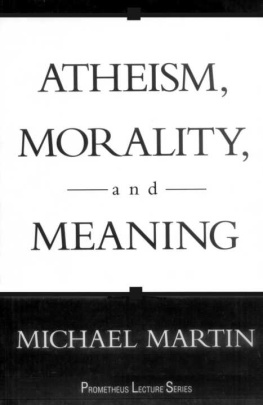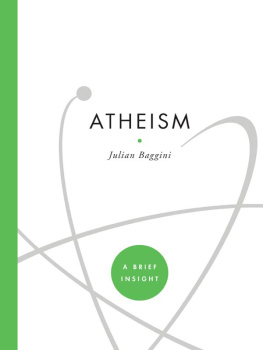Smith - Why atheism?
Here you can read online Smith - Why atheism? full text of the book (entire story) in english for free. Download pdf and epub, get meaning, cover and reviews about this ebook. City: Amherst, N.Y, year: 2003, publisher: Prometheus Books, genre: Religion. Description of the work, (preface) as well as reviews are available. Best literature library LitArk.com created for fans of good reading and offers a wide selection of genres:
Romance novel
Science fiction
Adventure
Detective
Science
History
Home and family
Prose
Art
Politics
Computer
Non-fiction
Religion
Business
Children
Humor
Choose a favorite category and find really read worthwhile books. Enjoy immersion in the world of imagination, feel the emotions of the characters or learn something new for yourself, make an fascinating discovery.
Why atheism?: summary, description and annotation
We offer to read an annotation, description, summary or preface (depends on what the author of the book "Why atheism?" wrote himself). If you haven't found the necessary information about the book — write in the comments, we will try to find it.
Smith: author's other books
Who wrote Why atheism?? Find out the surname, the name of the author of the book and a list of all author's works by series.
Why atheism? — read online for free the complete book (whole text) full work
Below is the text of the book, divided by pages. System saving the place of the last page read, allows you to conveniently read the book "Why atheism?" online for free, without having to search again every time where you left off. Put a bookmark, and you can go to the page where you finished reading at any time.
Font size:
Interval:
Bookmark:

Also by George h. Smith
Atheism: The Case Against God
Atheism, Ayn Rand, and Other Heresies


"[unto the subtleties of the mythologists it is not worth our while to inquire seriously; those, however, who use the language of proof we must cross examine.... "
Aristotle, Metaphysics
To
Jeff Ri99enbach
Philosophe and Friend


 more than the customary nod of appreciation to many friends who, acting above and beyond the call of philosophy, enabled me to write this book: Ross Levatter, Greg Morris, Vince Miller, Mark Valverde, Anton Sherwood, Tim Starr, Vincent Cook, Ellen Young, Mike Mayakis, Betty Huneycutt, Jean Kennedy, and Dick and Rennie Riemann.
more than the customary nod of appreciation to many friends who, acting above and beyond the call of philosophy, enabled me to write this book: Ross Levatter, Greg Morris, Vince Miller, Mark Valverde, Anton Sherwood, Tim Starr, Vincent Cook, Ellen Young, Mike Mayakis, Betty Huneycutt, Jean Kennedy, and Dick and Rennie Riemann.
My thanks also to:
Mark Read Pickens, for his advice and endurance;
Richard Martin, who shared my curiosity about heaven and hell;
Sharon Presley, a paradigm of independent thinking, for her indomitable spirit;
Robert Kephart and Andrea Rich, for being there;
Suzanne and Jeff Riggenbach, the irresistible force and the immovable object;
Steven Mitchell, editor in chief of Prometheus Books, for his ungodly patience and occasional diplomacy;
Brekke Kroutil-Mueller, my stepdaughter and philosophical companion, for proving that public education cannot kill intelligence;
and Laura Kroutil, my wife, for her love and much, much more.
George H. Smith
January 26, 2000

THE CREDIBILITY OF ATHEISM
 he title of this book, Why Atheism?, maybe construed in several different ways. It may be understood as a philosophical roll call wherein arguments for atheism are lined up and presented. Or it may be interpreted pragmatically as an inquiry into the benefits of atheism for the individual and society. Or we may view it as a historical investigation into the conditions and causes of modern atheism.
he title of this book, Why Atheism?, maybe construed in several different ways. It may be understood as a philosophical roll call wherein arguments for atheism are lined up and presented. Or it may be interpreted pragmatically as an inquiry into the benefits of atheism for the individual and society. Or we may view it as a historical investigation into the conditions and causes of modern atheism.
I shall touch on some of these issues later in this book, but I now wish to discuss another interpretation of Why Atheism?-namely, why should anyone, especially the religious believer, take the time and trouble to consider the atheistic point of view? We cannot, after all, explore every new idea that happens our way; we must be selective, focusing on some while ignoring others.
Assertions, arguments, doctrines, and the like (which, for the sake of convenience, I shall call propositions) must strike us as both relevant and credible before we will take time to investigate them further. A proposition is relevant if it is related to our intellectual interests, whether theoretical or practical. A relevant proposition is one whose truth or falsehood would have a significant impact on what we believe or how we act.
A proposition must also appear credible before we will take it seriously. If I am told, for example, that American astronauts did not really land on the moon but that this event was an elaborate hoax concocted by NASA to secure funding for the space program, I would likely reject this assertion outright-because, though interesting, it does not strike me as credible. True, I do not have the evidence in hand to prove that the moon landing was authentic, and we have abundant evidence of other governmental frauds; nevertheless, I would not take the time and effort to investigate this claim unless I were presented with enough presumptive evidence to establish its credibility. Only if I took it seriously enough to merit further investigation would I seek more detailed information that would resolve the issue one way or another to my own satisfaction.
To assess a proposition as credible is to say not that it is justified but that it is worthy of being justified. A credible proposition is one that we regard as worthy of further consideration. Without credibility a proposition will simply pass through our consciousness without stopping long enough to be examined. Credibility is like an Ellis Island of cognition, a checkpoint for immigrating ideas that are seeking permanent residence in our minds. Whether a proposition is turned away or admitted for further investigation will depend on how we assess its credibility.
The same point can be made by differentiating between a reasonable belief and a justified belief. A reasonable proposition is one that does not strike us as impossible or highly improbable, even though it may lack sufficient justification to warrant our assent. Of course, given the vast number of reasonable beliefs, we cannot examine every proposition that falls into this category. Severe limi tations of time require that we narrow our focus, selecting only those propositions that we regard as reasonable and relevant.
But even these conditions are sometimes insufficient, as when a proposition, though both reasonable and relevant, conflicts with our most strongly held beliefs. Consider, for instance, an intelligent Christian who confronts the agnostic's claim that God's existence cannot be proven one way or the other, so we should suspend judgment. This proposition is of great interest to the Christian, and it may even strike him as reasonable inasmuch as he can understand why other intelligent people might adopt this view. Nevertheless, the Christian might decline to investigate the arguments for agnosticism in any detail, because his own belief in God is so strong, his degree of certainty so high, as to render any further investigation unnecessary.
Much of this book is more concerned with the credibility of atheism than its justification. I shall argue that atheism is credible and should therefore be seriously considered by theists and agnostics alike. This is an essential link in the process of persuasion. If most Christians (and other religious believersl) dismiss atheism outright, this is not because they have examined the arguments for atheism and found them wanting, but because they do not take atheism seriously enough to examine its arguments in detail. Atheism, in their view, lacks credibility, so they have no motive to explore it further.
To portray atheism as utterly lacking in credibility has long played a crucial role in religious propaganda. Atheism must be rendered unthinkable, because doubt, if left unchecked, can easily propel the believer down the path of deconversion. (By deconversion, I mean the process by which a religious believer becomes an atheist.) Dire accounts of atheism, which portray deconversion as a descent into spiritual and moral oblivion, are propaganda born of religious necessity. Atheism lies at the end of a slippery slope, so the process of deconversion, if not immediately blocked, can easily advance to its final destination.
Font size:
Interval:
Bookmark:
Similar books «Why atheism?»
Look at similar books to Why atheism?. We have selected literature similar in name and meaning in the hope of providing readers with more options to find new, interesting, not yet read works.
Discussion, reviews of the book Why atheism? and just readers' own opinions. Leave your comments, write what you think about the work, its meaning or the main characters. Specify what exactly you liked and what you didn't like, and why you think so.

